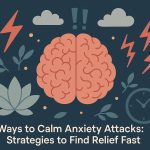Stress is a common part of life, but managing it effectively is crucial to maintaining mental and physical well-being. While deep breathing techniques are often recommended, there are many other methods that can help reduce stress and improve your quality of life. Let’s explore six unique and effective stress-busting techniques that go beyond the usual recommendations, helping you to feel more relaxed, focused, and in control.
How Can Improving Your Sleep Help With Stress Management?
One of the most important aspects of stress management is ensuring that you get enough quality sleep. Poor sleep can exacerbate stress, leading to a vicious cycle of exhaustion and anxiety. By making small adjustments to your nighttime routine, you can significantly improve your sleep, which in turn will help reduce stress.
Creating a relaxing bedtime environment, sticking to a consistent sleep schedule, and avoiding screen time before bed are all steps that can improve your sleep quality. Simple changes like upgrading your mattress or adjusting your room temperature can also make a big difference. The better you sleep, the more resilient you’ll be to the daily stresses of life, giving you the mental clarity and energy to tackle whatever comes your way.
How Can Mini Guitars Be an Unconventional Stress Reliever?
Music has long been known as a powerful tool for relaxation and emotional expression, but have you ever considered learning a new instrument as a way to manage stress? Playing a mini guitar is a unique and creative way to unwind, offering a physical and mental outlet for stress relief.
Mini guitars are portable and easy to play. This makes these smaller instruments a perfect choice for beginners and seasoned musicians alike. Engaging in music can activate the brain’s reward system, releasing dopamine and helping to lower cortisol levels—the hormone associated with stress. Whether you’re strumming simple chords or composing your own songs, playing a mini guitar offers a fun and fulfilling way to reduce stress and express yourself creatively.
Why Is Spending Time in Nature a Powerful Stress Buster?
Many people like to head outside when they feel overwhelmed. This is because time in nature has a way of making you feel better and less stressed. So, take a walk in the park, go to a mountain for a hike, or hang out near water. Just being in natural surroundings can significantly lower your stress levels. Research shows that exposure to nature helps reduce cortisol, lowers blood pressure, and improves overall mood.
You don’t need to embark on a lengthy camping trip to reap the benefits—just a few minutes outside each day can help clear your mind and restore a sense of calm. Nature offers an escape from the constant demands of modern life, providing an opportunity to disconnect and recharge. The simple act of breathing fresh air and listening to the sounds of nature can work wonders for your mental health.
How Can Art Therapy Help You Process Stress?
Another unique method for managing stress is art therapy. This form of creative expression allows individuals to explore and process emotions through drawing, painting, or other artistic mediums. You don’t need to be an experienced artist to benefit from art therapy—the act of creating something can be therapeutic in itself.
Art therapy offers a nonverbal outlet for dealing with stress and anxiety, helping you express feelings that may be difficult to put into words. By focusing on the creative process, you can enter a state of “flow,” which can provide relief from overthinking and excessive worry. Whether done independently or with a therapist, engaging in art can be a calming and reflective way to manage stress.
How Does Physical Exercise Help Alleviate Stress?
It’s no secret that physical activity is one of the best ways to reduce stress, but not all exercises are created equal. For maximum stress relief, focus on activities that you enjoy and that allow you to move your body without overexerting yourself. Yoga, Pilates, and even dancing are great examples of low-impact exercises that combine movement with mindfulness.
Can Journaling Your Thoughts Help You Cope With Stress?
Some people need to write down what they think and feel to manage their stress. Journaling allows you to reflect on your day, gain perspective on challenges, and release pent-up emotions. It also provides a private space to express fears, frustrations, or worries that may be difficult to share with others.
Journaling doesn’t require any special skills—just a notebook and a few minutes of your time each day. When you put your thoughts on paper, you can organize your mind, track patterns in your emotions, and develop healthier coping strategies. Regular journaling can help you gain clarity, release stress, and improve your emotional resilience.
Lynn Martelli is an editor at Readability. She received her MFA in Creative Writing from Antioch University and has worked as an editor for over 10 years. Lynn has edited a wide variety of books, including fiction, non-fiction, memoirs, and more. In her free time, Lynn enjoys reading, writing, and spending time with her family and friends.















